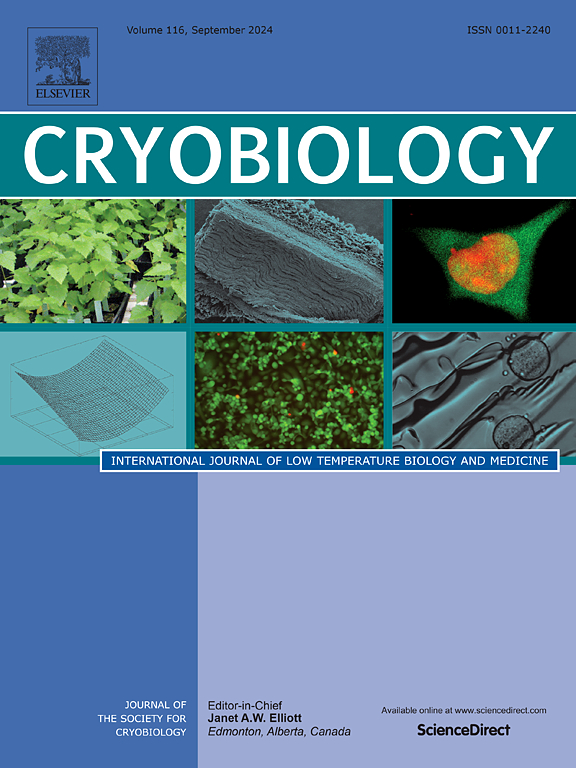LPA通过抑制调节因子TNF-α减少猪皮肤源性干细胞的凋亡。
IF 2.3
3区 生物学
Q2 BIOLOGY
引用次数: 0
摘要
在冷冻保存过程中保持干细胞的活力和功能是干细胞在再生医学中成功应用的关键。本研究旨在探讨溶血磷脂酸(LPA)对低温保存的猪皮肤源性干细胞(pSDSCs)凋亡的影响。结果表明,5 μM浓度的LPA可显著提高pSDSCs的生存能力,减少pSDSCs的凋亡。此外,我们的数据表明LPA通过受体1 (LPAR1)进入pSDSCs。在冷冻保存的pSDSCs中,LPA处理后,肿瘤坏死因子α (TNF-α)蛋白的表达水平下降,提示TNF-α参与了抗凋亡过程的调控。此外,我们发现雷昔莫特(R848),一种TNF-α激活剂,增加了冷冻保存的pSDSCs的凋亡水平。当LPA和R848同时作用于冷冻保存的pSDSCs时,LPA对细胞凋亡的保护作用减弱。综上所述,我们的研究表明,LPA可以有效抵消TNF-α-诱导的凋亡作用,从而提高冷冻保存的pSDSCs的存活率。重要的是,本研究探索了一种减少冷冻保存干细胞凋亡的新机制。本文章由计算机程序翻译,如有差异,请以英文原文为准。
LPA reduces the apoptosis of cryopreserved porcine skin-derived stem cells by inhibiting the regulatory factor TNF-α
Preserving the viability and functionality of stem cells during cryopreservation is crucial for their successful application in regenerative medicine. The aim of this study is to investigate the effect of lysophosphatidic acid (LPA) on reducing the apoptosis of cryopreserved porcine skin-derived stem cells (pSDSCs). Our findings revealed that LPA, at a concentration of 5 μM, significantly improved viability and reduced apoptosis in cryopreserved pSDSCs. Furthermore, our data indicated that LPA enters pSDSCs through receptor type 1 (LPAR1). In cryopreserved pSDSCs, after LPA treatment, the expression level of tumor necrosis factor alpha (TNF-α) protein decreased, suggesting TNF-α involvement in the regulation of the anti-apoptotic process. Additionally, we found that resiquimod (R848), a TNF-α activator, increased the level of apoptosis in cryopreserved pSDSCs. When cryopreserved pSDSCs were treated with both LPA and R848, the protective effect of LPA against apoptosis was decreased. In conclusion, our study demonstrates that LPA could effectively counteract the effect of TNF-α-induced apoptosis, thereby enhancing the survival rates of cryopreserved pSDSCs. Importantly, this study explored a novel mechanism of reducing apoptosis in cryopreserved stem cells.
求助全文
通过发布文献求助,成功后即可免费获取论文全文。
去求助
来源期刊

Cryobiology
生物-生理学
CiteScore
5.40
自引率
7.40%
发文量
71
审稿时长
56 days
期刊介绍:
Cryobiology: International Journal of Low Temperature Biology and Medicine publishes research articles on all aspects of low temperature biology and medicine.
Research Areas include:
• Cryoprotective additives and their pharmacological actions
• Cryosurgery
• Freeze-drying
• Freezing
• Frost hardiness in plants
• Hibernation
• Hypothermia
• Medical applications of reduced temperature
• Perfusion of organs
• All pertinent methodologies
Cryobiology is the official journal of the Society for Cryobiology.
 求助内容:
求助内容: 应助结果提醒方式:
应助结果提醒方式:


